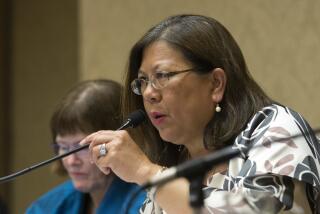Meese Broke Rules, Ethics Director Says
WASHINGTON — Atty. Gen. Edwin Meese III violated federal law because he failed to get government ethics office approval when he invested $60,000 in a limited blind partnership, the director of the ethics office said today.
Meese currently is the subject of a criminal investigation by special prosecutor James McKay, who will determine, among other things, whether any of Meese’s $60,000 was invested in scandal-plagued Wedtech Corp.
An attorney who is representing Meese in the criminal investigation, James Rocap, said today that none of the $60,000 had been invested in Wedtech. Meese announced in May that he would close out the blind partnership as of today.
The 1978 Ethics in Government Act “contains specific requirements for the creation of blind trusts, including necessity of approval by our office,” which Meese did not obtain, David Martin, director of the Office of Government Ethics, said in a letter to Congress.
Criminal Penalties
The ethics law involved contains criminal penalties. Martin said, however, that he has not delved into the question of whether they would apply in Meese’s case, because of the criminal investigation of the attorney general being conducted by McKay.
Martin made the statements in a letter to Rep. Gerry Sikorski (D-Minn.), chairman of the House Civil Service subcommittee on human resources, which oversees federal ethics requirements. Sikorski announced that he will hold congressional hearings on the Meese matter.
The ethics office determination “is further evidence of a pattern of poor judgment and a frightful collapse of ethics within the attorney general’s office,” Sikorski said in a statement. “Mr. Meese created a significant financial arrangement that was unapproved and outside the law.
“As the nation’s top law enforcement official, his conduct is inexcusable,” Sikorski said. “Just because Ed Meese said that his arrangements with Wedtech officials were blind did not make them so.”
Meese spokesman Terry Eastland said that “this is the first that we have heard that the Office of Government Ethics has taken issue (with the blind partnership arrangement)”.
Eastland said that “it is curious indeed that a Democratic chairman of a House subcommittee should be issuing statements on this matter, that he should be the one who is discussing this. It strikes us as a purely partisan political attack.”
Meese set up the financial arrangement in 1985 after he became attorney general to avoid potential conflicts of interest. He hired as the manager of the partnership W. Franklin Chinn, who was working for Wedtech and who subsequently sat on the company’s board of directors.
Meese has acknowledged interceding on Wedtech’s behalf in 1982 when he was White House counselor as the Bronx defense contractor campaigned for a $32-million no-bid Army contract. The company eventually got the work, following a controversial White House meeting chaired by Meese’s deputy, James Jenkins.
More to Read
Inside the business of entertainment
The Wide Shot brings you news, analysis and insights on everything from streaming wars to production — and what it all means for the future.
You may occasionally receive promotional content from the Los Angeles Times.










